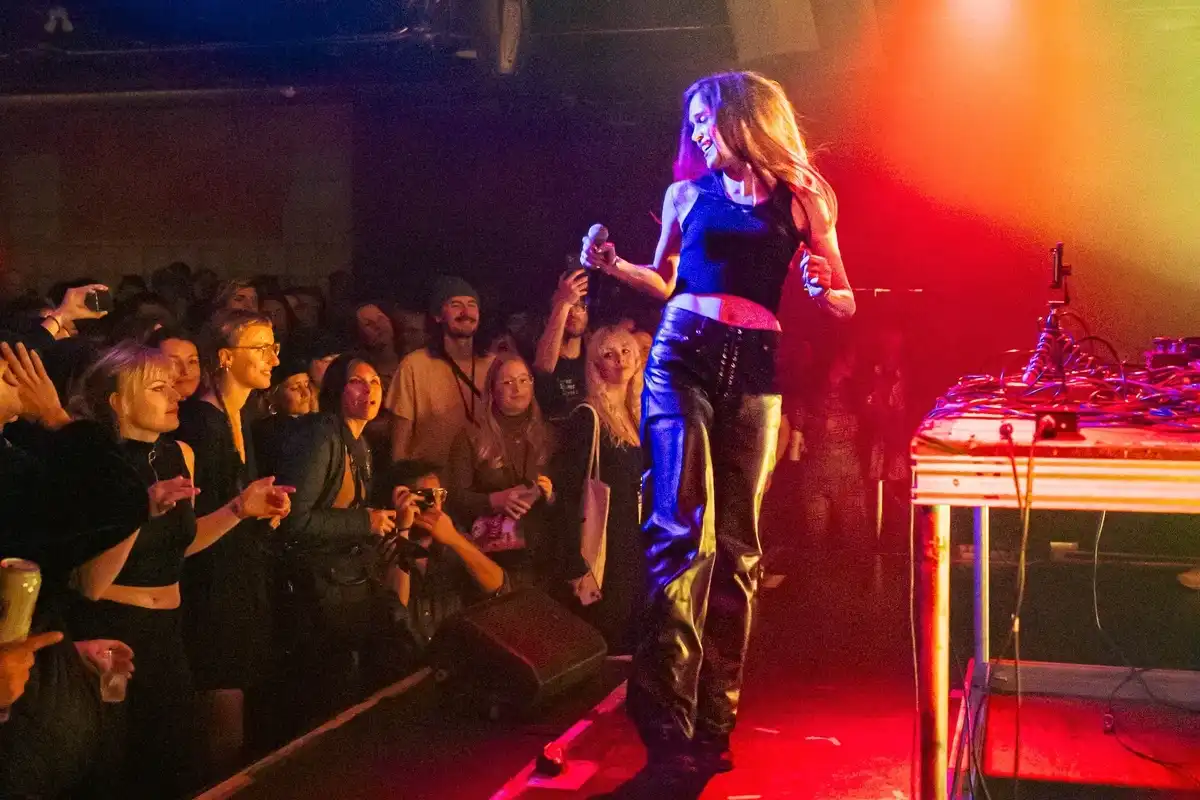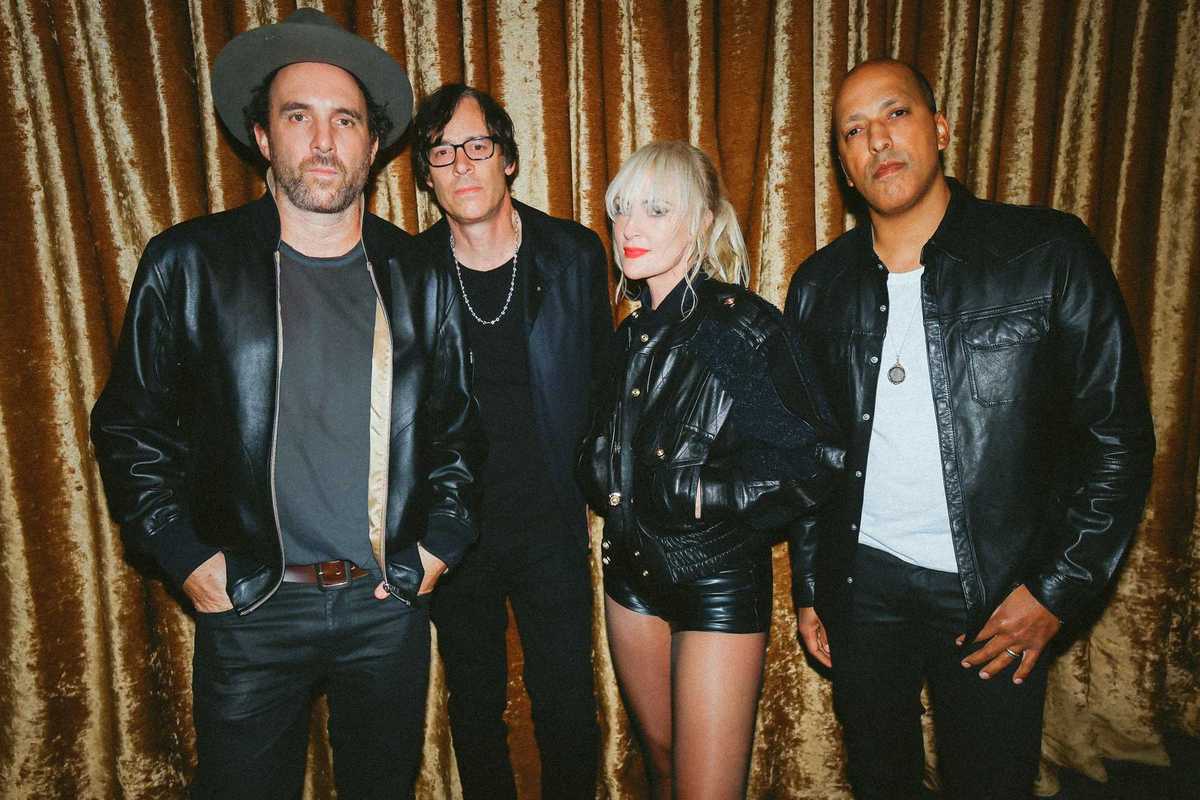How Quebec Markets Its Music To The World
Quebec talents attract diverse audiences beyond the province's borders. What sets them apart? We headed to M for Montreal to find out.

Marie Davidson at M for Montreal
Azzedine Fall is from France, but he's very familiar with the Quebec music scene. He started paying attention as a young journalist at French culture magazine Inrocks in the 2010s.
"TOPS, Grimes, Kaytranada — Montreal had a significant place in international independent music," he explains to Billboard Canada. Quickly, his interest in local talents led him to cross the Atlantic to cover the Montreal International Jazz Festival and, gradually, M for Montreal. "I saw Mac DeMarco on stage, and that's when I understood that something important was happening here."
Returning to Montreal each year for over a dozen years as part of his work, Azzedine Fall believes he knows what attracts the French audience to Quebec musicians. "I remember seeing Hubert Lenoir on stage at M for Montreal: he sang in French with a very UK, very indie attitude, and that was rare in France at the time."
As for Quebec artists who sing in English, they have a lead over the French. "TOPS, Mac DeMarco, Grimes... we don't have equivalents in France in these skills. Here, the Anglophone culture is different from what we have in France, and it's much more credible," he continues.
That was one of the driving forces behind M for Montreal, says programmer Mathieu Aubre.
"There was the Canadian Music Week in Toronto, but for the Francophone industry in the rest of Canada that didn't recognize itself there, there was really something to fill."
M for Montreal took place from Nov. 15-18, bringing Canadian and international visibility to Quebec music and artists.
"We want it to be a meeting place," says Aubre. This year, he selected around 30 Quebec artists and groups, including Marie Davidson, La Sécurité, Goodbye Karelle, Hippie Hourrah, Robert Robert, Totalement Sublime or Kanen, who performed for a professional audience from around the world.
The festival's popularity remains strong. On the launch of its 18th edition at Ausgang Plaza, M for Montreal was packed. Industry folks engaged in exchanges in both French and English between showcases of artists like Teon Gibbs and Parazar. There were Quebecers, Dutch, Americans, Britons. In all, some 350 local and international professionals gathered to network and celebrate music.
Azzedine Fall is among them. For the second year, he heads the delegation from France. "The French at M for Montreal this year are surprised by the closeness that can be created here. Everything happens more naturally, and we talk much more about the artists," he confides during a cocktail and a burger before going to see other concerts. According to him, it is for this reason — friendliness and accessibility — that professionals and music enthusiasts want and continue to come to the festival and to Montreal in general.
The head of the French delegation also believes that the Quebec industry has a very organic relationship with music. "I feel that people who work in music have instrumental knowledge, which doesn't exist in Paris. There, in the industry, everyone comes from a business school, and it's very specialized."
According to the Société de développement des entreprises culturelles québécoises (SODEC), one of the festival's main financial partners, M for Montreal is a significant market. "It's an extraordinary opportunity to check the interest of foreign professionals in very particular artistic proposals whose potential is not yet known internationally," says Élaine Dumont, General Director of International Affairs, Exportation, and Marketing of Cinema at SODEC.
For her, events like M for Montreal are a fantastic way to gauge interest in Quebec musicians. "They are at home with their audience, so they can give the best of themselves, and that is precious," says Élaine Dumont.
Similarly, SODEC supports collective presence, which means making sure Quebec artists and music industry professionals are represented at festivals worldwide. "We collaborate with M for Montreal, Mundial Montreal, FME, POP Montreal, for example, so that they send professionals internationally," she adds. Thus, M for Montreal participates in events such as SXSW in Texas, Reeperbahn Festival in Germany, The New Colossus in New York and The Great Escape Festival in England.
"The festival has a good network in France, Germany, the UK, the US, and the rest of Canada," notes Aubre. And because the French market is not approached like that of Francophone Africa, for example, SODEC, with an annual budget of over $4 million for the export of Quebec music, also offers specific support to territories. "We distribute various aids that allow us to take risks, support artists' careers and develop audiences outside Quebec and internationally," says Dumont.
Mathieu Aubre is also pleased to see many young professionals at the head of the French delegation led by Azzedine Fall and among all the participants at M for Montreal. Several new music professionals joined the festival for the first time this year and took part in their first networking activities alongside industry heavyweights, such as the SXSW programmer, who returns every year, and the program directors of Coachella and Glastonbury, who "were there to spot artists," he enthuses.
This year, M for Montreal also welcomed Nora Felder, the music supervisor who developed the soundtrack for the Netflix hit series Stranger Things. Every year, M for Montreal hosts around twenty music supervisors on the lookout. "When a song by Thaïs plays in Emily in Paris, it becomes interesting in terms of visibility and profitability for us," says Aubre. "There is a concentration of music supervisors at the festival, and it's something we work a lot on at SODEC to develop opportunities between Quebec publishers and films, series, ads and video games abroad," adds Dumont.
"We really want these big names to know the professionals here to create exchange bridges, Aubre says. "Because if the Quebec industry shines, Quebec artists will end up shining too!"
This article was originally published by Billboard Canada in French. Read the French version here.

















